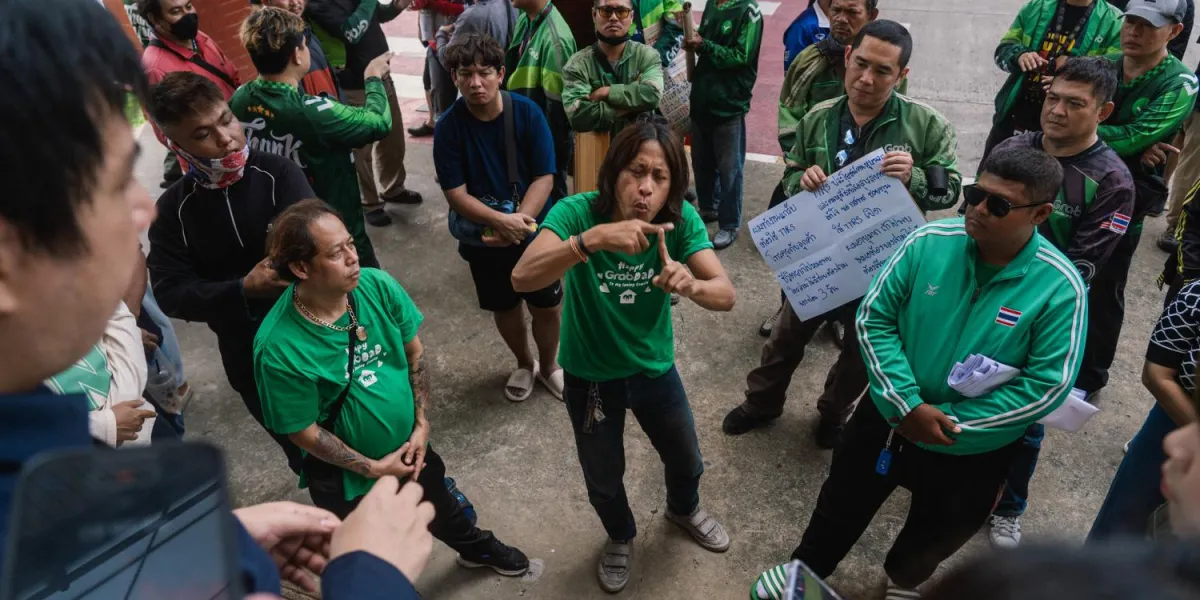This article was originally published on Prachatai.
For the past three months, the Thailand Telecommunication Relay Service (TTRS), which provides online sign language interpretation services for people with hearing impairments, has been shut down due to delay in funding approval.
The service has been suspended since June. Although the National Broadcasting and Telecommunications Commission (NBTC), which grants budget to the service, said the matter may be finalised in September, the suspension has already disrupted the lives of deaf people, who rely on TTRS for daily communication.
TTRS operates 24/7, handling around 1,200 to 1,600 calls per day and providing approximately 450,000 services per year. The service supports deaf and hearing-impaired people while working, going to medical appointments, or even communicating with family members.
“Even talking to my children or people in my family, I can’t contact them. I want the center to reopen as soon as possible,” Saiyan, a deaf community leader, told Thisable.me on July 4, the same day that around 50 deaf people lodged complaints with the NBTC.
“Before TTRS, I had to book an interpreter at least three days in advance. I had to consult with them about what I wanted to say. But there is no way to inform people about emergencies in advance. Sometimes we’re sick or we have to file police reports.”
“Whether I was selling things or talking with people who aren’t deaf, I relied on this [TTRS’s] service. … If there’s an accident or a car crash, what are deaf people supposed to do? Sit and wait to be contacted by someone else who can help?” Opas said.
More than 1,000 riders with hearing impairments working with platforms such as Grab, Lalamove, Line Man, and Foodpanda have lost the ability to communicate with customers for directions. Their income has dropped. They are also effectively barred from the platforms due to the breakdown in communication.
“When they set the location in Grab, as soon as they see that the rider is deaf, they immediately press cancel,” said Nabdao Ongapichart, president of the Deaf Thai Rainbow Club (DTRC), referring to her friends who had to switch to passenger services like GrabBike, where communication is limited to face-to-face interactions, after TTRS shut down.

Nabdao added that without TTRS’s services, deaf shop owners can no longer ask customers for details or explain when items are out of stock, resulting in negative reviews and plummeting ratings. Meanwhile, deaf customers struggle to clarify orders with shops or restaurants and communicate with delivery staff, often leading to mistakes and frustration.
“Hearing people are also affected because they want to communicate with deaf people. This happens in places where deaf people work. Deaf people with medical conditions also rely on interpreters to talk with doctors. Now, everything is worse.”
“Business operators also face problems. They want to communicate with deaf people. Before, they used TTRS’s service. Just press the phone, turn on the camera, they could communicate with each other instantly. But now, everything is shut down.”
As director of the Miss, Mister, Miss Queen, and Mrs. Deaf Thailand pageants, Nabdao relies heavily on TTRS to contact sponsors and supporters. Without these services, her events—which aim to raise recognition for deaf people—have been postponed. Sending representatives to compete abroad now requires covering costs out of pocket. Instead of growing, the organisation has been forced to shrink.
“When TTRS was first established, deaf people were still confused and did not understand how it would help or if it would really work. It turned out that TTRS helped us tremendously, especially deaf people living in the provinces or remote rural areas. They really benefited. Life became much more convenient. … It felt like they finally had true equality.”
Budget delay
Under the Universal Service Obligation (USO) plan, TTRS received funding on a project-based basis from the National Broadcasting and Telecommunications Commission (NBTC), whose budget comes from a 2.5% levy on telecommunications companies’ revenue, totalling around 4–7 billion baht per year.
Delays in budget approval like this routinely occur whenever there is a transition between USO plans. Over time, delays in budget approval have worsened, particularly for Plan 4—the fourth implementation cycle of the USO program, which began in July 2023. As of June 2025, nearly two years later, no funding has been approved.
TTRS has tried to expedite budget approval. They have a meeting with the NBTC chairman on March 14, pressing for explanation of the delays. A letter was sent to the NBTC secretary urging project approval, but there was no response. A second letter was filed to the chairman so the matter could be discussed with the board.
The NBTC explained that although TTRS’s project has already passed both approval stages, it must wait for other projects that have not yet been completed, following instructions to consolidate all projects for approval.
In response to media claims of lack of transparency or misuse of funds, TTRS said they are completely false. Its project has passed all approval and auditing procedures, with every receipt strictly verified and any unused funds fully returned.
